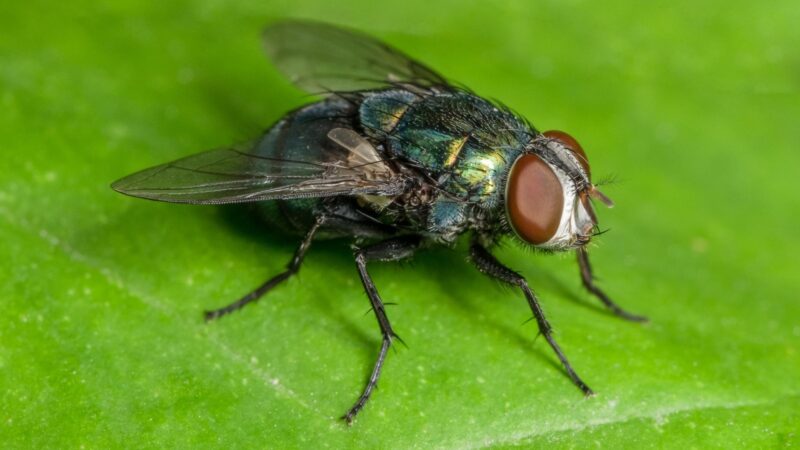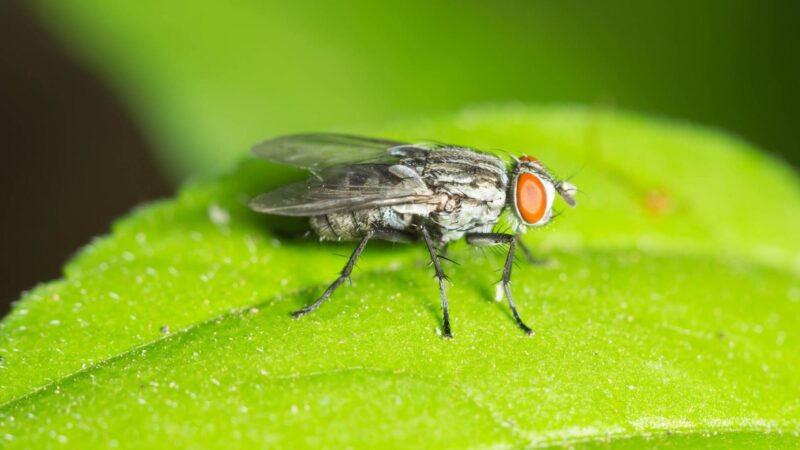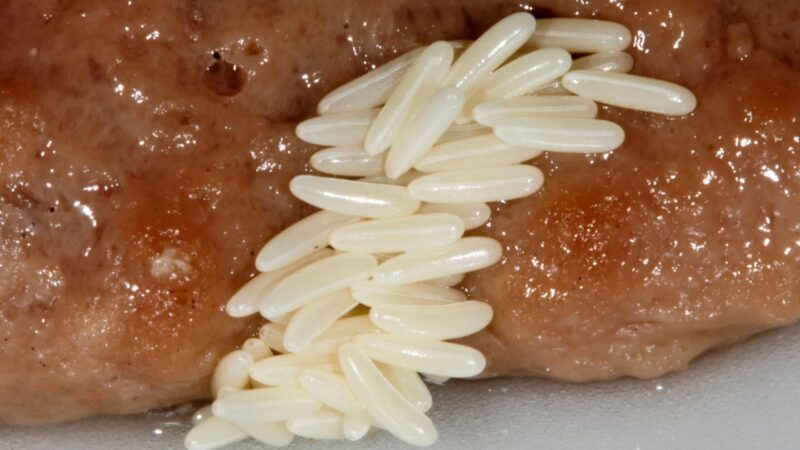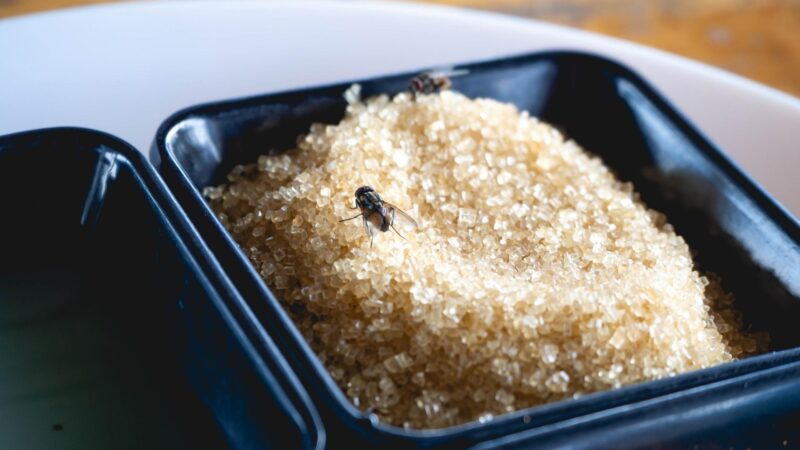Flies are not only nuisance pests but also pose health risks. Unfortunately, a lot of people focus on getting rid of adult flies. They tend to forget that adult flies are previously larvae, also called maggots.
Like adult flies, they can also contaminate food and are dangerous. These maggots came from very small eggs.
Where do flies lay their eggs? Flies lay their eggs in moist organic matter, such as fermenting fruits, open wounds, garbage, human and animal feces, and dead animals. These breeding sites are also food for developing fly larvae. Once humans ingest heavily contaminated food, they are very likely to get sick.
Maggots are not usually visible until you see them in an infested area. On the other hand, fly eggs are almost invisible to the naked eye. This is why getting rid of them can be very challenging.
Fortunately, this article explains everything you need to know about fly larvae and eggs and how to deal with them correctly.
Table of Contents
Do Flies Lay Eggs?

Flies lay eggs but not all fly species. Interestingly, the tsetse fly (Glossina) doesn’t lay eggs but rather gives birth to its young (larvae), one by one.
Also called tik-tik flies, these biting flies also feed their young with milk while it is still inside their body. Once born, the maggot burrows into the dirt, where it will pupate.
Related: Do All Maggots Turn Into Flies? | Information and Facts
What Do Fly Eggs Look Like?
Fly eggs are white or pale, about 1.2 mm long, and look like tiny grains of rice. They are elongated, sticky, and mostly appear in groups. If there is only one fly egg, you should use a microscope, so you can see it.
But if you want to be sure, wait for about 24 hours. It will turn into a maggot which is a white, legless worm.
How Many Eggs Does a Fly Lay?
A female fly can lay around 75-150 eggs within 3-4 days and up to 900 eggs in her lifetime. The exact number of eggs laid depends on the species, the size and health of the mother, and the weather.
The most number of fly eggs produced usually occurs when the temperature is 25 to 30°C (77-86°F).
How Do Flies Lay Eggs?
Flies lay eggs either in singles or clusters. But since fly eggs don’t hatch in dry places, flies will first look for moist and decomposing organic matter that can also be the food source of maggots.
This includes fresh manure of animals and humans, garbage, dead animals, fermenting fruits, hays, and grass clippings.
Do Flies Lay Eggs Every Time They Land?

Flies don’t always lay eggs every time they land. Instead of using their mouths, flies use receptors on their feet to taste whether food is nutritious for them or not.
In most cases, you may notice that flies rub their feet when they land on food. They clean their feet to make sure that the taste test result is accurate.
Do Flies Vomit When They Land?
Contrary to common myth, flies don’t vomit when they land on food. Instead, they regurgitate saliva to liquefy the food. Flies don’t have teeth to chew solid food.
They have to release digestive juices before they can eat the food. So, even if a fly lands on your food for only a few seconds, you can still safely eat it.
When Do Flies Lay Eggs?
Flies usually lay eggs during the summer months, which is also their peak season. The life cycle of flies, from egg to adult is between 3 and 7 days.
Once adults emerge from the pupal stage, it may take 10-14 days before they mate. Shortly, they will start to lay eggs, and these eggs will hatch into maggots.
Can Flies Lay Eggs in Your Skin?
In general, flies don’t lay eggs on human skin. But if you have an open wound, flies may deposit eggs on it. Soon after, eggs will hatch, and maggots will burrow into your skin.
In some cases, larvae may also move inside the flesh around the wound. Even if larvae won’t move, it may still lead to an infection called Myiasis.
Do Flies Lay Eggs on Dog Poop?
Flies lay eggs on dog poop, especially if it is still fresh and wet. In fact, they also lay eggs on the feces of other animals and even humans. Once larvae emerge, they will start to eat the poop until their pupal stage.
As disgusting as it is, adult flies also eat poop by breaking down its substances so they can drink the juice.
Do Flies Lay Eggs on Food?
Flies lay eggs on food. Although they enjoy laying eggs on rotting meat and spoiled food, flies may also choose fresh fruits and vegetables and sugary foods.
But according to a study, fruit flies (Drosophila melanogaster) also lay eggs on bitter and salty foods. If given a choice, this fly species will avoid sugary foods.
How Long Does It Take for Fly Eggs to Hatch?
If the temperature is 59°F (15°C), fly eggs may hatch in 24 hours. But if the temperature reaches 99°F (37.2°C), they hatch in 7.5 hours only. Therefore, fly eggs hatch faster during higher temperatures.
Once hatched, maggots will start to feed. Fly larvae undergo three larval stages, which usually last for 3 to 7 days.
What Do Fly Eggs Look Like on Food?

When fly eggs are on food, they look like small grains of white rice. Unless they are in large numbers, you may not even notice their presence. This is also why you should hide your food from them.
This includes fruits, vegetables, sweetened foods, and more. If you have rotten or spoiled foods, throw them right away.
What Happens if You Eat Fly Eggs?

Generally speaking, nothing bad will happen to you if you eat fly eggs. Once you swallow fly eggs, the digestive acid on your stomach will automatically kill them.
The truth is, you may have accidentally eaten them, and you just did not realize it. Unless you eat heavily contaminated spoiled food, you will be perfectly fine.
How to Kill Fly Eggs and Maggots?
Killing adult flies only will not solve the problem. Note that flies lay more than 100 eggs in just a few days. Therefore, you should also focus on breaking their life cycle. But you can only do this if you kill fly eggs and maggots.
However, the biggest challenge is that they are very small. Here are some useful tips:
- Throw away all spoiled foods, including fruits and vegetables. These items are among the favorite breeding sites of flies, and maggots also eat them.
- Remove dead animals and animal feces immediately, especially in the attic and outside your house. Flies also love to lay eggs on them.
- Clean your kitchen thoroughly right after cooking, and make sure there is no food debris left.
- Always keep your floors clean and dry. Also, avoid having standing water. Flies are very attracted to damp, moist areas.
- Mix one part bleach or one-part ammonia and one part hot water. Pour the mixture into an infested garbage can. Cover it tightly so that bleach will not degrade quickly. Never mix bleach with ammonia since the mixture can be very poisonous when inhaled.
- Alternatively, pour boiling water on the walls of the garbage can very carefully.
- To be more effective, add vinegar to the boiling water.
- If maggots are in your yard or outdoor garbage can, you may also spread Diatomaceous Earth (DE) around the area.
- Once maggots and fly eggs are dead, wash the garbage can with soapy water and rinse it using a garden hose. Dry it completely before placing a trash bag inside.
- If maggots and fly eggs are on your carpet, remove their food source and sprinkle the boric acid powder on it.
- Use a vacuum cleaner to remove the dead maggots, fly eggs, and boric acid powder from your carpet.
- If you are using a bagless vacuum cleaner, pour bleach on the canister to make sure all maggots and fly eggs are dead.
- To remove the stain that could attract maggots, clean your carpet using a steam cleaner.
- Use insect growth regulator (IGR) sprays such as Gentrol Aerosol Insect Growth Regulator. IGRs don’t kill adult flies but rather prevent egg production and hatching and larvae from molting.
Note: Essential oils from some plants such as cinnamon, eucalyptus, lavender, and tea tree can effectively repel adult flies and maggots. But they cannot kill them.
Will Disinfectant Kills Fly Eggs?
Most disinfectants can kill fly eggs, especially bleach. However, use bleach with extra care. Inhalation of undiluted bleach can lead to asthma, while direct contact can irritate your eyes and skin. Rubbing alcohol can also kill fly eggs, but it is highly flammable. It is also relatively toxic when a huge amount is inhaled.
Will Vinegar Kill Maggots?
Vinegar kills maggots but not all fly species. According to a study, fruit flies are very attracted to the odor of vinegar. This is because acetic acid (a major ingredient of vinegar) is the main component in fruit fermentation. Ripe fruits have a low vinegar concentration, while rotten fruits have a higher acid concentration.
Does Salt Kill Maggots Instantly?
Salt will not kill maggots instantly but gradually. This is because salt can eliminate moisture, and fly larvae will slowly die of dehydration. This is also why sprinkling salt in garbage cans helps prevent a maggot infestation. For more effective results, add lime to salt and pour the mixture into your garbage bins.
Does Lemon Juice Kill Maggots?
Lime or lemon juice kills maggots, but it is not effective alone. Instead, you should first mix it with salt to kill maggots. To be more effective and to help prevent future infestation, spray the infected area with vinegar or bleach solution.
Does Bleach Kill Maggots Instantly?
Bleach won’t kill maggots instantly and may take about 30 minutes. Bleach has very strong chemical fumes that will slowly suffocate maggots. However, use bleach only if it is registered with the U.S. Environmental Protection Agency (EPA) as a pesticide. The product label should have an EPA Registration Number.
Summary
As you most likely have realized by now, sanitation is the best way to keep flies away. You should not only be clean inside your house but outside as well. Once you have eliminated their food sources, these pesky pests will move to another place. This practice should be continuous. Otherwise, flies will soon return.
List of Sources
Questions and Answers about Flies and Ants
Indoor Flies and Their Control
Curious Kids: Do Flies Really Throw Up on Your Food When They Land On It?